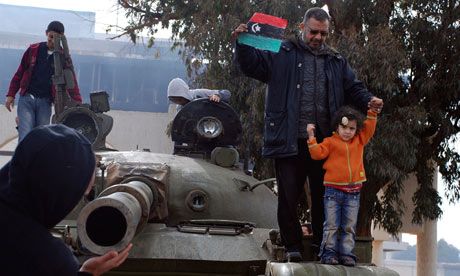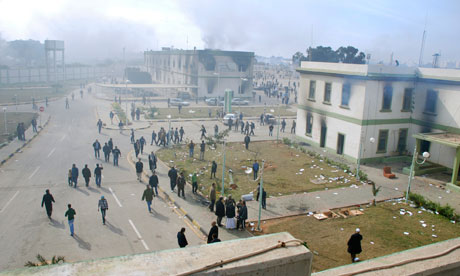Libyan city dubbed 'Free Benghazi' as anti-Gaddafi troops take control

Libya's second city, Benghazi, appears to have fallen beyond the control of Muammar Gaddafi, with the local military defying his regime and monarchy-era flags flying from government buildings.
As the first foreign news organisation to report from so-called Free Benghazi, the Guardian witnessed defecting troops pouring into the courtyard of a ransacked police station carrying tonnes of weaponry and ammunition looted from a military armoury to stop it being seized by forces loyal to the Libyan dictator.
Soldiers brought rockets and heavy weapons which had been used in an assault on citizens in central Benghazi on Saturday as Gaddafi tried to keep control of the city. Doctors in Benghazi said that at least 230 people were killed, with a further 30 critically injured.
There was also the clearest confirmation yet that Gaddafi's regime used outside mercenaries to try to suppress the rebellion. Adjoining the police station a large crowd gathered in another courtyard. Upstairs, the Guardian saw a number of mercenaries, allegedly flown in the previous week, being interrogated by lawyers and army officials.
• Listen to Martin Chulov describe the scene in Benghazi
• Follow our live blog of events in Libya
• Watch a British teacher speaking from Tripoli
An air force officer, Major Rajib Faytouni, said he personally witnessed up to 4,000 mercenaries arrive on Libyan transport planes over a period of three days starting from 14 February. He said: "That's why we turned against the government. That and the fact there was an order to use planes to attack the people."
Numerous witnesses in Benghazi have said that while artillery was used against citizens, air force planes did not fire on them here. They did, however, according to Faytouni, drop two bombs inside the Rajma military base to stop weapons falling into the hands of anti-government forces.
"The two colonels who defected in MiGs had refused orders to bomb the people," he said, referring to a pair of air force officers who fled to Malta in their jets on Monday. He added: "There were also two helicopters that flew to Tunis."
All around Benghazi there were indications that Gaddafi has lost control of the city. The military is no longer operating checkpoints, which are now manned only by a handful of traffic police. Every physical sign of the dictator has been taken down or burned. While there has been no violence in the past two days, angry demonstrators are driving through city firing Kalashnikov rifles into the air and demanding Gaddafi cede control and leave the country.
The former Libyan flag, dating from the reign of the monarch ousted by Gaddafi, King Idris, is flying above ransacked government buildings on the waterfront. Off the coast, several passenger ferries wait in storm-tossed seas to pick up foreign nationals being evacuated. The UK government has announced that a Royal Navy warship, HMS Cumberland, will be moved to wait off the Libyan coast, but no military ships could be seen.
 Burning buildings at the entrance to a security forces compound in Benghazi, Libya Photograph: Alaguri/AP
Burning buildings at the entrance to a security forces compound in Benghazi, Libya Photograph: Alaguri/AP Military checkpoints between Benghazi and Egypt to the east are now manned only by armed militias.
Earlier the UN security council passed a unanimous statement calling for an immediate end to the violence in Libya and demanding that Gaddafi live up to his responsibilities to protect his own people.
The 15 council members said they condemned the violence and repression of peaceful demonstrators after the Libyan dictator issued his defiance of the international community on Tuesday.
The statement called for the immediate lifting of restrictions on all forms of the media and for the safety of foreign nationals to be ensured.
Libya's deputy ambassador to the UN, Ibrahim al-Dabashi, who has joined a number of Libyan diplomats in defecting from the Gaddafi regime, said the security council's position did not go far enough. "It is not strong enough but any message to the Libyan government at this stage is good."
Dabashi said he had received reports that "genocide" had begun in the west of the country, with ground attacks occurring from Libyan forces working alongside "mercenaries from many African countries".
Fuente The Guardian
No hay comentarios:
Publicar un comentario